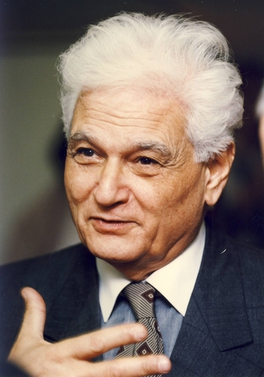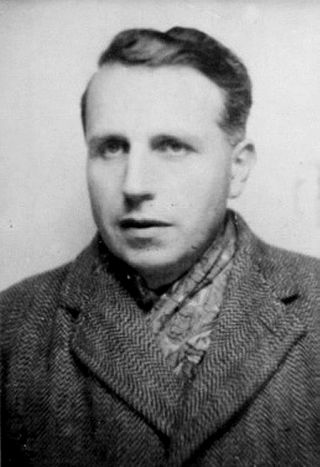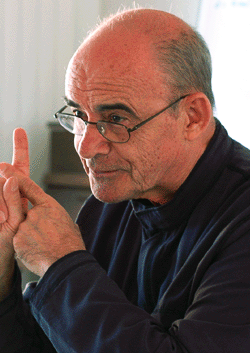Related Research Articles
Deconstruction is any of a loosely-defined set of approaches to understanding the relationship between text and meaning. The concept of deconstruction was introduced by the philosopher Jacques Derrida, who described it as a turn away from Platonism's ideas of "true" forms and essences which are valued above appearances. Since the 1980s, these proposals of language's fluidity instead of being ideally static and discernible have inspired a range of studies in the humanities, including the disciplines of law, anthropology, historiography, linguistics, sociolinguistics, psychoanalysis, LGBT studies, and feminism. Deconstruction also inspired deconstructivism in architecture and remains important within art, music, and literary criticism.
Postmodern philosophy is a philosophical movement that arose in the second half of the 20th century as a critical response to assumptions allegedly present in modernist philosophical ideas regarding culture, identity, history, or language that were developed during the 18th-century Age of Enlightenment. Postmodernist thinkers developed concepts like difference, repetition, trace, and hyperreality to subvert "grand narratives", univocity of being, and epistemic certainty. Postmodern philosophy questions the importance of power relationships, personalization, and discourse in the "construction" of truth and world views. Many postmodernists appear to deny that an objective reality exists, and appear to deny that there are objective moral values.
The Sokal affair, also called the Sokal hoax, was a demonstrative scholarly hoax performed by Alan Sokal, a physics professor at New York University and University College London. In 1996, Sokal submitted an article to Social Text, an academic journal of cultural studies. The submission was an experiment to test the journal's intellectual rigor, specifically to investigate whether "a leading North American journal of cultural studies—whose editorial collective includes such luminaries as Fredric Jameson and Andrew Ross—[would] publish an article liberally salted with nonsense if (a) it sounded good and (b) it flattered the editors' ideological preconceptions."

Jacques Derrida was an Algerian-born French philosopher. He developed the philosophy of deconstruction, which he utilized in numerous texts, and which was developed through close readings of the linguistics of Ferdinand de Saussure and Husserlian and Heideggerian phenomenology. He is one of the major figures associated with post-structuralism and postmodern philosophy although he distanced himself from post-structuralism and disowned the word "postmodernity".

Georges Albert Maurice Victor Bataille was a French philosopher and intellectual working in philosophy, literature, sociology, anthropology, and history of art. His writing, which included essays, novels, and poetry, explored such subjects as eroticism, mysticism, surrealism, and transgression. His work would prove influential on subsequent schools of philosophy and social theory, including poststructuralism.

Jean-François Lyotard was a French philosopher, sociologist, and literary theorist. His interdisciplinary discourse spans such topics as epistemology and communication, the human body, modern art and postmodern art, literature and critical theory, music, film, time and memory, space, the city and landscape, the sublime, and the relation between aesthetics and politics. He is best known for his articulation of postmodernism after the late 1970s and the analysis of the impact of postmodernity on the human condition. Lyotard was a key personality in contemporary continental philosophy and authored 26 books and many articles. He was a director of the International College of Philosophy founded by Jacques Derrida, François Châtelet, Jean-Pierre Faye, and Dominique Lecourt.
John David Caputo is an American philosopher who is the Thomas J. Watson Professor of Religion Emeritus at Syracuse University and the David R. Cook Professor of Philosophy Emeritus at Villanova University. Caputo is a major figure associated with postmodern Christianity and continental philosophy of religion, as well as the founder of the theological movement known as weak theology. Much of Caputo's work focuses on hermeneutics, phenomenology, deconstruction, and theology.

Jean-Luc Nancy was a French philosopher. Nancy's first book, published in 1973, was Le titre de la lettre, a reading of the work of French psychoanalyst Jacques Lacan, written in collaboration with Philippe Lacoue-Labarthe. Nancy is the author of works on many thinkers, including La remarque spéculative in 1973 on Georg Wilhelm Friedrich Hegel, Le Discours de la syncope (1976) and L'Impératif catégorique (1983) on Immanuel Kant, Ego sum (1979) on René Descartes, and Le Partage des voix (1982) on Martin Heidegger.
Différance is a French term coined by Jacques Derrida. It is central to Derrida's concept of deconstruction, a critical outlook concerned with the relationship between text and meaning. The term différance means both "difference of meaning" and "deferral of meaning".
"Logocentrism" is a term coined by the German philosopher Ludwig Klages in the early 1900s. It refers to the tradition of Western science and philosophy that regards words and language as a fundamental expression of an external reality. It holds the logos as epistemologically superior and that there is an original, irreducible object which the logos represent. According to logocentrism, the logos is the ideal representation of the Platonic ideal.
Postmodern theology, also known as the continental philosophy of religion, is a philosophical and theological movement that interprets theology in light of post-Heideggerian continental philosophy, including phenomenology, post-structuralism, and deconstruction.
Performativity is the concept that language can function as a form of social action and have the effect of change. The concept has multiple applications in diverse fields such as anthropology, social and cultural geography, economics, gender studies, law, linguistics, performance studies, history, management studies and philosophy.
"Structure, Sign, and Play in the Discourse of the Human Sciences" was a lecture presented at Johns Hopkins University on 21 October 1966 by philosopher Jacques Derrida. The lecture was then published in 1967 as chapter ten of Writing and Difference.
In modern usage, the term grammatology refers to the scientific study of writing systems or scripts. This usage was first elucidated in English by linguist Ignace Gelb in his 1952 book A Study of Writing. The equivalent word is recorded in German and French use long before then. Grammatology can examine the typology of scripts, the analysis of the structural properties of scripts, and the relationship between written and spoken language. In its broadest sense, some scholars also include the study of literacy in grammatology and, indeed, the impact of writing on philosophy, religion, science, administration and other aspects of the organization of society. Historian Bruce Trigger associates grammatology with cultural evolution.
Christopher Wise is a cultural theorist, literary critic, scholar, and translator. His publications largely focus on Sahelian West Africa, especially Mali, Burkina Faso, and Senegal, as well as Palestine, Jordan, and Israel. He has also published theoretical works on Fredric Jameson, Jacques Derrida, and Noam Chomsky.
Roberto Rino Magliola is an Italian-American academic specializing in European hermeneutics and deconstruction, comparative philosophy, and inter-religious dialogue. He is retired from National Taiwan University and Assumption University of Thailand.
Martin McQuillan is a Scottish-born literary theorist, cultural critic and journalist currently employed at Edge Hill University. He was Professor of Literary Theory and Cultural Analysis and Dean of the Faculty of Arts and Social Sciences at Kingston University, London, where he was also Co-Director of The London Graduate School, and was Deputy Vice-Chancellor of Research, Business and Innovation between 2015 and 2017. He was previously Pro-Dean of Research (2005–09) for the Faculty of Performance, Visual Arts and Communications at the University of Leeds, where he was also Head of the School of Fine Art, History of Art and Cultural Studies (2001–2005). Before that he was a lecturer in English at Staffordshire University (1997–2000).
The following is a bibliography of John D. Caputo's works. Caputo is an American philosopher closely associated with postmodern Christianity.
Gregg Lambert is an American philosopher and literary theorist, who writes on Baroque and Neo-Baroque cultural history, critical theory and film, the contemporary university, and especially on the philosophers Gilles Deleuze and Jacques Derrida. Between 2008 and 2014, he was the founding director of Syracuse University Humanities Center, where he currently holds the distinguished research appointment as Dean's Professor of Humanities, and was Principal Investigator and Founding Director of the Central New York Humanities Corridor between 2008-2019.CNY Corridor
References
- ↑ Van Wyck, Peter. (2004) Telling Stories. The Semiotic Review of Books. Vol. 14.2 (2004) p. 3
- ↑ For a detailed account of his thesis, see Cooren, Francois (1999) Deconstructing Communication. Representation, Subject and Economies of Exchange, by Briankle G. Chang. Communication Theory. February; 9 (1), and Martínez Ramos, Dora (1998). Reseña de Deconstructing Communication: Representation, Subject. and Economies of Echange, por Briankle G. Chang. Comunicación y Sociedad,No. 28, septiembre-diciembre, p. 199
- ↑ Office of the Dean. (9 December 2016). "Briankle Chang Wins 'Edited Book of the Year' Award by National Communication Association". SBS Faculty News. Retrieved 9 December 2016.